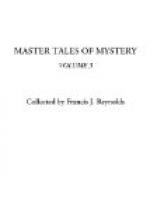after three have been drawn are exactly the same as
ever. If we toss a cent and heads appear twelve
times, that does not have the slightest effect on
the thirteenth toss—there is still an even
chance that it, too, will be heads. So if ‘17’
had come up five times to-night, it would be just
as likely to come the sixth as if the previous five
had not occurred, and that despite the fact that before
it had appeared at all odds against a run of the same
number six times in succession are about two billion,
four hundred and ninety-six million, and some thousands.
Most systems are based on the old persistent belief
that occurrences of chance are affected in some way
by occurrences immediately preceding, but disconnected
physically. If we’ve had a run of black
for twenty times, system says play the red for the
twenty-first. But black is just as likely to turn
up the twenty-first as if it were the first play of
all. The confusion arises because a run of twenty
on the black should happen once in one million, forty-eight
thousand, five hundred and seventy-six coups.
It would take ten years to make that many coups, and
the run of twenty might occur once or any number of
times in it. It is only when one deals with infinitely
large numbers of coups that one can count on infinitely
small variations in the mathematical results.
This game does not go on for infinity—therefore
anything, everything, may happen. Systems are
based on the infinite; we play in the finite.”
“You talk like a professor I had at the university,”
ejaculated DeLong contemptuously as Craig finished
his disquisition on the practical fallibility of theoretically
infallible systems. Again DeLong carefully avoided
the “17,” as well as the black.
The wheel spun again; the ball rolled. The knot
of spectators around the table watched with bated
breath.
Seventeen won!
As Kennedy piled up his winnings superciliously, without
even the appearance of triumph, a man behind me whispered,
“A foreign nobleman with a system—watch
him.”
“Non, monsieur,” said Kennedy quickly,
having overheard the remark, “no system, sir.
There is only one system of which I know.”
“What?” asked DeLong eagerly.
Kennedy staked a large sum on the red to win.
The black came up, and he lost. He doubled the
stake and played again, and again lost. With
amazing calmness Craig kept right on doubling.
“The martingale,” I heard the men whisper
behind me. “In other words, double or quit.”
Kennedy was now in for some hundreds, a sum that was
sufficiently large for him, but he doubled again,
still cheerfully playing the red, and the red won.
As he gathered up his chips he rose.
“That’s the only system,” he said
simply.
“But, go on, go on,” came the chorus from
about the table.
“No,” said Kennedy quietly, “that
is part of the system, too—to quit when
you have won back your stakes and a little more.”




